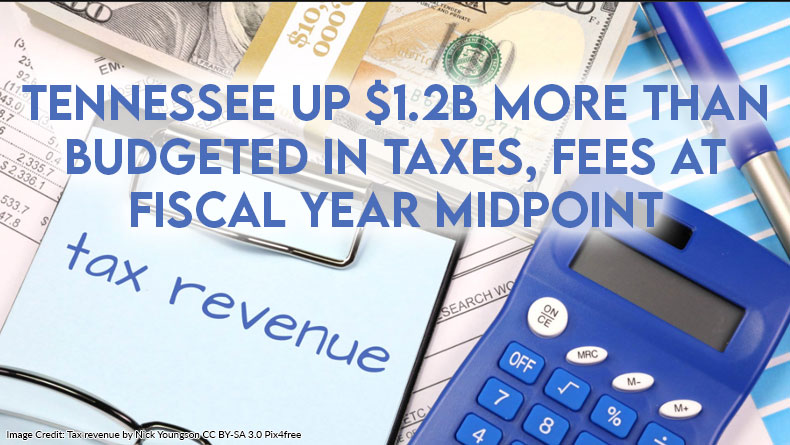Image Credit: Tax revenue by Nick Youngson CC BY-SA 3.0 Pix4free
The Center Square [By Jon Styf] –
Tennessee has collected $1.2 billion more in taxes and fees than budgeted during the first six months of the fiscal year. The overages are then able to be used by lawmakers the next year.
“Underestimating revenues creates unplanned surpluses which can be spent the following year or saved in the rainy day fund,” Sycamore Institute Deputy Director Mandy Spears Pellegrin wrote in her monthly state revenue tracker. “The trade-off of a surplus is that policymakers may have preferred to either spend the money or reduce taxes in the current year.”

A large portion of those collections are sales taxes from across the state. Through six months, Tennessee has collected nearly $7 billion in sales taxes, ahead of the budgeted amount of $6.2 billion. For the month of January, $1.3 billion in sales taxes were collected, which was $131 million more than budgeted.
“We are very mindful that economic activity appears to be moderating from early elevated levels. January sales tax receipts, reflecting consumer holiday spending in December, followed reports of lower sales trends nationally – the lowest growth rate since September 2020,” said Tennessee Department of Finance and Administration Commissioner Jim Bryson.
The second-largest factor in the budget overage was $354 million in franchise and excise taxes collected in January, which was $79 million higher than the budget. For the year, franchise and excise collections are $2 billion, which is $395 million more than budgeted.

“On a positive note, state corporate tax revenues, or franchise and excise taxes, and mixed drink taxes outperformed expectations,” Bryson said. “Still, rising interest rates have caused sharp declines in realty transfer and realty mortgage tax collections reported within privilege tax receipts. All other monthly taxes combined declined when compared to last year.”
The largest question is what happens the remainder of the fiscal year as collection expectations slow, according to experts who contributed to the budgeted estimates.
“While we are pleased with the strong revenue growth seen in the first half of this fiscal year, we remain cautious, closely monitoring economic conditions and revenue trends to ensure fiscal stability,” Bryson said.


About the Author: Jon Styf, The Center Square Staff Reporter – Jon Styf is an award-winning editor and reporter who has worked in Illinois, Texas, Wisconsin, Florida and Michigan in local newsrooms over the past 20 years, working for Shaw Media, Hearst and several other companies. Follow Jon on Twitter @JonStyf.


